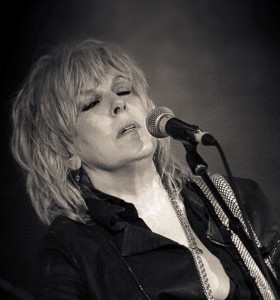
Lucinda Williams may be in self-imposed lockdown but thankfully, her spirit remains wild, free, raucous and rebellious. Catching up with Williams at home on the eve of the release of her 14th studio album, Good Souls, Better Angels, she throatily laughed and is clearly having a ball, despite the self-imposed confinement that Covid-19 has brought to the global musical fraternity.
After around 40 years in the business, Williams is little short of being a true US national treasure, a musician who unceasingly holds the power to surprise, inspire and delight with each passing year. Indeed, in recent years her albums have truly grown in importance and strength, never slowing or slipping quietly from attention. With each new release, she seems to carve out yet another unexpected slice of extraordinary emotion and power. Both previous releases, Down Where The Spirit meets The Bone (2014) and Ghosts of Highway 20, (2016) were delivered on her own label and set the tone for her continued visceral view of life, love and pretty much everything in between. Good Souls, Better Angels is another offering that continues that trajectory with absolute assurance and raw emotion at its howling heart this time released by Nashville’s leading Thirty Tigers label.
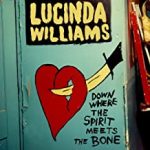 In some ways Williams blurs musical edges with every new offering: post-punk blues and Americana merge with disturbing imagery and fearless honesty, giving her work a truly unique vibe and essential commanding significance. With three Grammys already in the bag and accolades that most would kill for, Williams is never one to sit back on her lauded laurels but instead pushes on always working the road, now with her strident lyricism complimented by input and production help from her husband and manager, Tom Overby. Her trusted road band, guitarist Stuart Mathis, bassist David Sutton and drummer Butch Norton, all add their assured flourishes to the new album which Williams described as being “really pretty stripped-down. Ray’s studio has cool, old equipment and we’d been working on the road touring the 20th anniversary of Car Wheels On A Gravel Road, which Ray originally produced back in 19
In some ways Williams blurs musical edges with every new offering: post-punk blues and Americana merge with disturbing imagery and fearless honesty, giving her work a truly unique vibe and essential commanding significance. With three Grammys already in the bag and accolades that most would kill for, Williams is never one to sit back on her lauded laurels but instead pushes on always working the road, now with her strident lyricism complimented by input and production help from her husband and manager, Tom Overby. Her trusted road band, guitarist Stuart Mathis, bassist David Sutton and drummer Butch Norton, all add their assured flourishes to the new album which Williams described as being “really pretty stripped-down. Ray’s studio has cool, old equipment and we’d been working on the road touring the 20th anniversary of Car Wheels On A Gravel Road, which Ray originally produced back in 19
98, so when we got into the studio again it all came together in about two weeks. It felt like we were all on fire.”
So, I asked, is this lockdown hurting, preventing promotion of the new album and the usual necessary support tour? Williams thinks not: “Well in reality I’m here at home doing interviews, speaking to lots of journalists about it all, so maybe that’s even better! I’m doing a lot of press and that’s filling up time. I’m taking it one day at a time. I have downtime. Last year I was out on the road so much, so this does give me that downtime.”
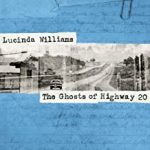 Of course one of the wonderful things about Williams is the sheer impossibility, not to say pointlessness, of trying to categorize her into a musical box. Genres dissolve when Williams, with her genre-stripping vocal delivery, roars round the next musical corner: Americana, country, rock and blues—all have their place, all tell a story, and all are included in her unbridled passion and power. This lady has stories to tell and a voice that soars.
Of course one of the wonderful things about Williams is the sheer impossibility, not to say pointlessness, of trying to categorize her into a musical box. Genres dissolve when Williams, with her genre-stripping vocal delivery, roars round the next musical corner: Americana, country, rock and blues—all have their place, all tell a story, and all are included in her unbridled passion and power. This lady has stories to tell and a voice that soars.
When I suggested this latest release marks something of a departure from her usual fare, Williams laughed and heartily agreed.
“Yeah, well I’m really happy with how it turned out. I went into the studio with much more than we recorded here. So I’ve some songs that are ready and will make it to the next album. They’re not all like these,” she explains, hinting at the darker nature of some featured on Good Souls, Better Angels, songs that don’t just scrape at the surface of difficult themes but deeply slice into and expose them mercilessly.

The current resident of 1600 Pennsylvania Avenue takes a hammering; and Williams’ own, alarming personal domestic violence experiences are reflected in the lyrics too. When I expressed my horror at the domestic violence issues featured, Williams was typically frank and forthright: “It was me once. I found myself in that place, in one of those relationships. He’d drink whisky and become a sort of Jekyll and Hyde character. There’d be this change in his personality, really terrible. It was as if he didn’t know who I was! I’ve written about him before, my songs ‘Jailhouse Jesus’ and ‘Buttercup’ are both about that time, about him too. I was kinda nervous about including the song on the new album at first. We were in the
studio cutting it and a real big, famous rock-star was there listening. He said he didn’t think I should include it. Maybe better to put it out as a ‘B’ side to a single, but not as an album track. I had a doubt in my own mind. But the others there were really supportive, so I put it on the album.”
Williams agrees the album has a different feel from much of her previous output,: “We went into the studio with my road band. Usually I bring in others, musicians and singers, and I sort of harmonize along with them. But we all talked about it, and didn’t do that this time. I think it really adds something to it all. I had a listening party in New York City and Jesse Malin told me the album had a sound, it was a cross between Howling Wolf and Iggy Pop. I loved that. It was exactly what I wanted, what I was aiming at,” she laughed again.
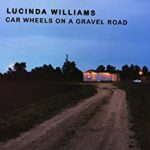 The entire production was “organic” she confirmed, never strictly or purposely planned: “I had an organic perspective for this one. I was in the studio again with Ray Kennedy—we worked together on Car Wheels (on a Gravel Road). So I feel I’ve come full circle here with this one. Ray has this Nashville studio. I was asked to go along, check it out. And it was just right to cut something there. Although, originally, it was never the plan to record another whole album with Ray at the time. But when I got there into the studio, it was obvious right away. And with Ray engineering again, it just had that sound. He just knows what I’m looking for.”
The entire production was “organic” she confirmed, never strictly or purposely planned: “I had an organic perspective for this one. I was in the studio again with Ray Kennedy—we worked together on Car Wheels (on a Gravel Road). So I feel I’ve come full circle here with this one. Ray has this Nashville studio. I was asked to go along, check it out. And it was just right to cut something there. Although, originally, it was never the plan to record another whole album with Ray at the time. But when I got there into the studio, it was obvious right away. And with Ray engineering again, it just had that sound. He just knows what I’m looking for.”
Williams was pleased when I mentioned the raw, blues feel and vibe that is evident with the new release, and she confirmed a love for that rough-edged, raw Delta sound, an admiration for blues legend, Robert Johnson, that has bubbled its way to the surface here: “I’ve always loved the imagery in Robert Johnson’s songs. Those really dark Delta blues are sort of biblical. I was inspired by Leonard Cohen—he dealt with that in his songs—and Bob Dylan and Nick Cave. The Devil comes into play quite a bit on this album,” she quipped.
Parting company, I told Williams we once met briefly at Scotland’s wonderful Celtic Connections Festival a few years ago. She chuckled and said, “I hope we meet up again, come and say hello, wherever, or maybe whenever, that might turn out to be!”
—Iain Patience
Scottish by birth and now based in SW France, Iain Patience holds degrees in Anthropology and Law. A qualified UK lawyer and a practicing journalist, Patience has written for a British national daily broadsheet, The Daily Telegraph, and BBC Radio, He’s written sketch comedy for UK national Radio & TV and serious pieces for Elmore Magazine. Patience is now the Editor of Blues Matters Magazine, UK.




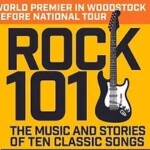


Be the first to comment!